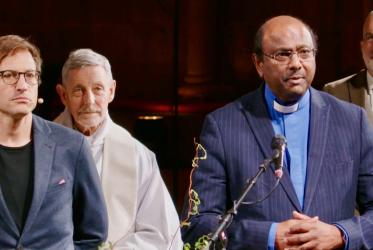The World Council of Churches (WCC), along with the Geneva Interfaith Forum on Climate Change, Environment and Human Rights; Franciscans International; and Brahma Kumaris World Spiritual University organised a public panel discussion on climate change and human rights from the perspective of ethics, spirituality and justice on 13 February at UN office in Geneva.
The panel focused on ethics, climate justice and human rights related to current negotiations within the United Nations Framework Convention on Climate Change (UNFCCC), including interfaith collaboration for advocacy on climate issues and human rights as an element of climate justice.
“Human rights framework is in place to ensure moral, ethical and legal accountabilities for all commitments, including climate commitments,” explained Benjamin Schachter, human rights officer at the UN Office of the High Commissioner for Human Rights. “Human Rights must be part of solution. Rights-based action on climate change is the legal and moral imperative and the only hope for the future.”
Dinesh Suna, coordinator of WCC’s Ecumenical Water Network, served as one of the panellists. He outlined the historical engagement of WCC in ecological justice. He highlighted that, much before the UNFCCC process began in the 1990s, WCC was already actively engaged in climate change issues in the 1970s.
He noted that at the Vancouver Assembly in 1983, WCC was working in the areas of justice, peace, and the integrity of creation, which became known as the JPIC process. In 1988, the WCC launched its Climate Change Program. From the very first Conference of Parties (COP1) in 1995 in Berlin to the COP22 in Marrakech, WCC has been actively engaged in advocating for a strong legally binding agreement to address climate change.
Suna drew attention to the difference between 500,000 signatures submitted during COP1 by faith communities and the 1.8 million signatures submitted in COP21 in Paris.
Suna also highlighted some of the key features of the recently issued statement by the WCC Executive Committee in China. He emphasised the “moral imperative of fossil fuel divestment and of investing in a low-carbon path to realizing economic, social and ecological well-being and sustainability for the whole creation.”
The information about WCC and many of its member churches, including The United Church of Canada and Church of Sweden, among others, divesting from fossil fuel, generated a lot of discussion among the participants, given the fact that some of these governments are known for their love of fossil fuel.
Suna finally drew a nexus between food, water and climate change. He highlighted the virtual water hidden in food, and challenged participants to move towards reducing their meat consumption to address both the water crisis as well as climate change. He also gave an example of how WCC became a “Blue Community” last year and challenged the UN and other organisations based in Geneva to replace bottled water with tap water.






